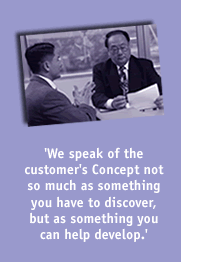
Learn to Manage the Evolution of Your Customer's Concept
| Ïðîäàæè | ||||
| Sales.com | ||||
| Keeping... | ||||
by Stephen E. Heiman, Diane Sanchez with Tad Tuleja
Your Customer's Concept—which we describe as the potential buyer's expectation of what you and/or your product will be able to do for him or him—isn't static. Like everything else in selling, it evolves in response to new experiences and new information, including the information you bring him. In fact, no matter how you, as a salesperson, handle the sale, the Concept is inevitably going to change over time. There are three ways this can happen:
 It's obvious
which is the best-case scenario here. It's always preferable for you to
manage the evolution of a Customer's Concept with him, rather than allow
it to be shaped by him alone, or worse yet, by him with your competition.
It's obvious
which is the best-case scenario here. It's always preferable for you to
manage the evolution of a Customer's Concept with him, rather than allow
it to be shaped by him alone, or worse yet, by him with your competition.
Because you can strongly influence the way someone thinks about doing business with you, we speak of the Customer's Concept not so much as something you have to discover as something you can help develop. Bob Mayes, a vice president for the Santa Fe real-estate company Las Campanas, emphasizes the importance of this nuance. At Las Campanas, he says, "We co-create a communication process that helps someone decide. We help them process information, show them alternatives, and provide them with a better way to verbalize what they're seeking but may have only been internalizing." Bob's goal is to be a "facilitator" of the buying decision.
Another example comes from Richard Brashier, vice president of sales for ATS, a Premiere Technologies Company. A global group communications provider, ATS offers its corporate clients conferencing solutions for a wide range of venues, from three-person team meetings to international events that might involve thousands of participants. Obviously, these conferences can't all be treated alike. Each one has to be managed according to the client's specific needs, and this often means helping the customer to develop their concept.
"We dealt recently with a high-tech equipment manufacturer," says Brashier, "which was experiencing difficulty in getting software upgrade information out to its many different distribution channels. We helped them set up product and user seminars, but it was obvious that this particular customer needed much more than that, so we had to sit down with them and design a very specific solution, uniquely configured to this manufacturer's distribution network. We ended up providing them not just the standard conference calls that many companies could provide, but a suite of marketing and educational services that were specific to their needs. We ran the telephone-based seminars, assisted with the registration process, distributed materials, and provided follow-up feedback and coaching. Their underlying issue, we discovered, was trying to drive down the cost per contact with their distributors. We were able to address those issues with full event management.
Not that ATS will deliver only high-end solutions. "We can certainly provide a lower-end solution, if that's what's required," says Brashier, "and in fact, a certain portion of our business entails just that—technologically straightforward dials-ups for small weekly meetings. But you've got to offer a range of options. And the level is always determined by what the customer wants. We recognize that business operates on multiple levels, so we have to customize our solutions to the specific situation. This often means working with the customer to develop their concept."
Successful salespeople like Mayes and Brashier think of their work as a process of continuous refinement. They approach each individual sales call with the understanding that the call begins, but never ends, with the preconceived Concept. Gradually, building on a series of sales calls, they evolve a concept of mutual success with every person they contact. But it all begins with the initial Concept, that cluster of impressions and past experiences—successes and aggravations, satisfactions and gripes—your customer has in his mind when you first enter his office.
Adapted
from The New Conceptual Selling
Stephen E. Heiman, Diane Sanchez with Tad Tuleja (c) 1999 by Miller Heiman,
Inc., All rights reserved with permission of Warner Books. Inc.